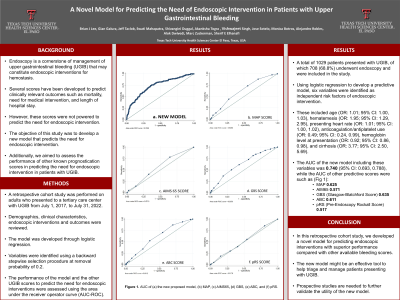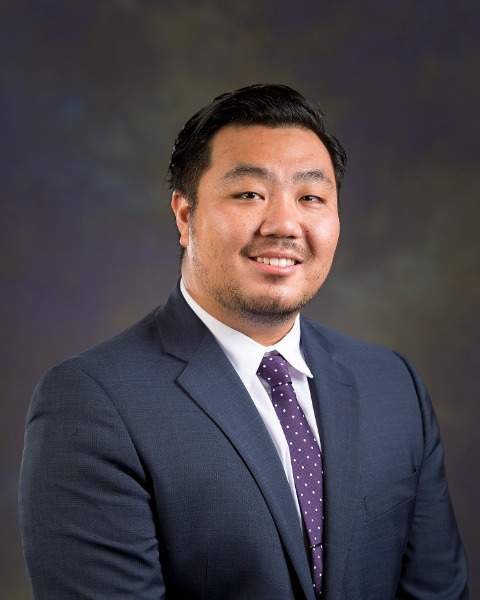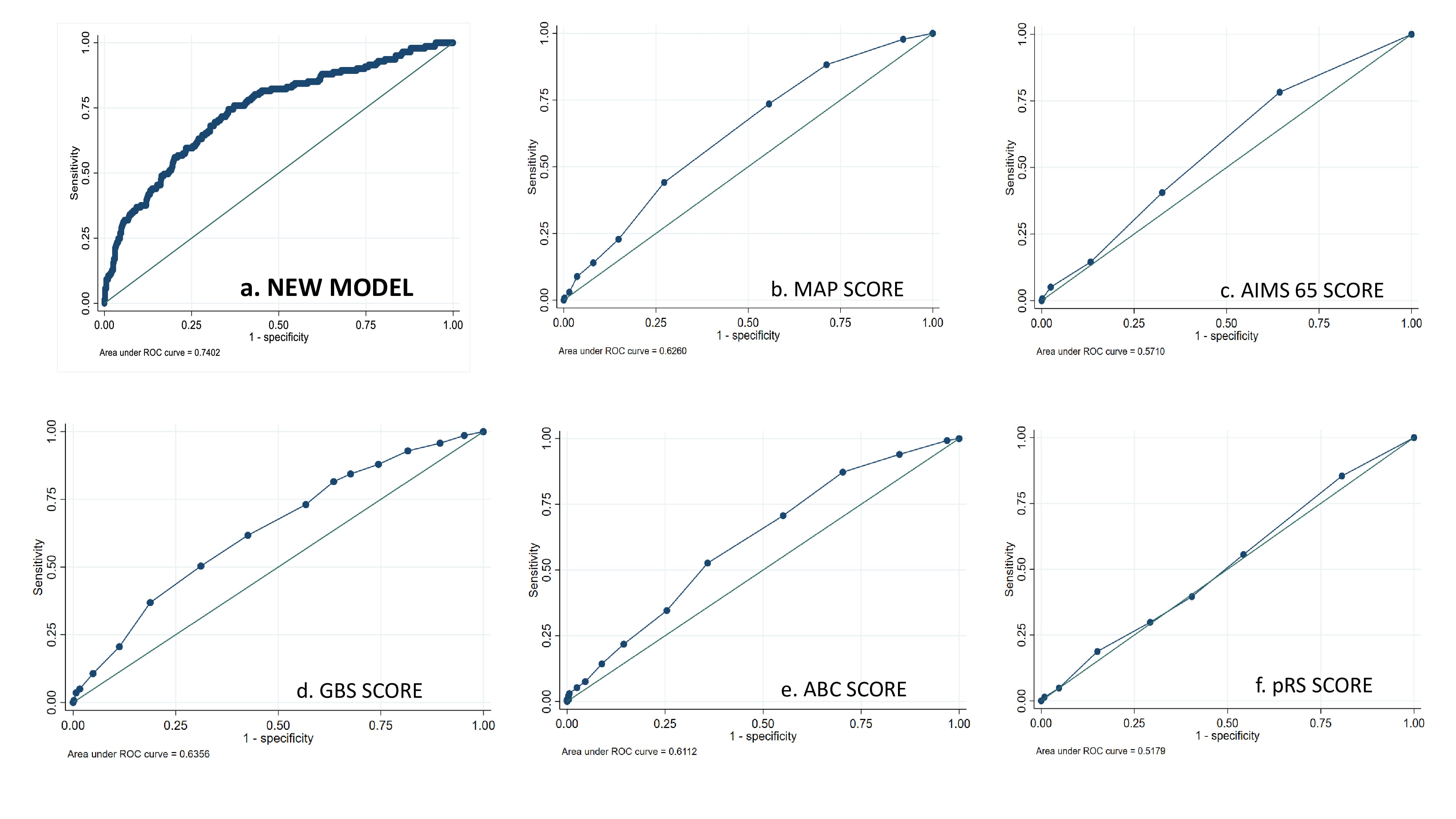Monday Poster Session
Category: GI Bleeding
P2452 - A Novel Model for Predicting the Need of Endoscopic Intervention in Patients With Upper Gastrointestinal Bleeding
Monday, October 28, 2024
10:30 AM - 4:00 PM ET
Location: Exhibit Hall E

Has Audio

Brian Lee, DO
Paul L. Foster School of Medicine, Texas Tech University Health Sciences Center
San Antonio, TX
Presenting Author(s)
Brian Lee, DO1, Gian Galura, MD2, Jeff Taclob, MD3, Swati Mahapatra, DO2, Akanksha Togra, MD2, Shivangini Duggal, MD4, Vishwajeet Singh, PhD2, Jose W. Sotelo, MD2, Monica Botros, MD2, Alejandro Robles, MD3, Alok Dwivedi, PhD5, Marc Zuckerman, MD2, Sherif E.. Elhanafi, MD2
1Paul L. Foster School of Medicine, Texas Tech University Health Sciences Center, San Antonio, TX; 2Texas Tech University Health Sciences Center, El Paso, TX; 3Paul L. Foster School of Medicine, Texas Tech University Health Sciences Center, El Paso, TX; 4TTUHSC, El Paso, TX; 5Texas Tech University Health Sciences Center, El Paso, TX
Introduction: Endoscopy is a cornerstone of management of upper gastrointestinal bleeding (UGIB) that may constitute endoscopic interventions for hemostasis. Several scores have been developed to predict clinically relevant outcomes such as mortality, need for medical intervention, and length of hospital stay. However, these scores were not powered to predict the need for endoscopic intervention. The objective of this study was to develop a new model that predicts the need for endoscopic intervention. Additionally, we aimed to assess the performance of other known prognostication scores in predicting the need for endoscopic intervention in patients with UGIB.
Methods: A retrospective cohort study was performed on adults who presented to a tertiary care center with UGIB from July 1, 2017, to July 31, 2022. Demographics, clinical characteristics, endoscopic interventions and outcomes were reviewed. The model was developed through logistic regression. Variables were identified using a backward stepwise selection procedure at removal probability of 0.2. The performance of the model and the other UGIB scores to predict the need for endoscopic interventions were assessed using the area under the receiver operator curve (AUC-ROC).
Results: A total of 1029 patients presented with UGIB, of which 708 (68.8%) underwent endoscopy and were included in the study. Using logistic regression to develop a predictive model, six variables were identified as independent risk factors of endoscopic intervention. These included age (OR: 1.01; 95% CI: 1.00, 1.03), hematemesis (OR: 1.95; 95% CI: 1.29, 2.95), presenting heart rate (OR: 1.01; 95% CI: 1.00, 1.02), anticoagulation/antiplatelet use (OR: 0.49; 95% CI: 0.24, 0.99), hemoglobin level at presentation (OR: 0.92; 95% CI: 0.86, 0.98), and cirrhosis (OR: 3.77; 95% CI: 2.50, 5.69). The AUC of the new model including these variables was 0.740 (95% CI: 0.693, 0.788), while the AUC of other predictive scores were such as GBS (Glasgow-Blatchford Score) (0.635), MAP (0.625), ABC (0.611), AIM65 (0.571) and pRS (Pre-Endoscopy Rockall Score) (0.517) (Fig 1).
Discussion: In this retrospective cohort study, we developed a novel model for predicting endoscopic interventions with superior performance compared with other available bleeding scores. The new model might be an effective tool to help triage and manage patients presenting with UGIB. Prospective studies are needed to further validate the utility of the new model.

Disclosures:
Brian Lee, DO1, Gian Galura, MD2, Jeff Taclob, MD3, Swati Mahapatra, DO2, Akanksha Togra, MD2, Shivangini Duggal, MD4, Vishwajeet Singh, PhD2, Jose W. Sotelo, MD2, Monica Botros, MD2, Alejandro Robles, MD3, Alok Dwivedi, PhD5, Marc Zuckerman, MD2, Sherif E.. Elhanafi, MD2. P2452 - A Novel Model for Predicting the Need of Endoscopic Intervention in Patients With Upper Gastrointestinal Bleeding, ACG 2024 Annual Scientific Meeting Abstracts. Philadelphia, PA: American College of Gastroenterology.
1Paul L. Foster School of Medicine, Texas Tech University Health Sciences Center, San Antonio, TX; 2Texas Tech University Health Sciences Center, El Paso, TX; 3Paul L. Foster School of Medicine, Texas Tech University Health Sciences Center, El Paso, TX; 4TTUHSC, El Paso, TX; 5Texas Tech University Health Sciences Center, El Paso, TX
Introduction: Endoscopy is a cornerstone of management of upper gastrointestinal bleeding (UGIB) that may constitute endoscopic interventions for hemostasis. Several scores have been developed to predict clinically relevant outcomes such as mortality, need for medical intervention, and length of hospital stay. However, these scores were not powered to predict the need for endoscopic intervention. The objective of this study was to develop a new model that predicts the need for endoscopic intervention. Additionally, we aimed to assess the performance of other known prognostication scores in predicting the need for endoscopic intervention in patients with UGIB.
Methods: A retrospective cohort study was performed on adults who presented to a tertiary care center with UGIB from July 1, 2017, to July 31, 2022. Demographics, clinical characteristics, endoscopic interventions and outcomes were reviewed. The model was developed through logistic regression. Variables were identified using a backward stepwise selection procedure at removal probability of 0.2. The performance of the model and the other UGIB scores to predict the need for endoscopic interventions were assessed using the area under the receiver operator curve (AUC-ROC).
Results: A total of 1029 patients presented with UGIB, of which 708 (68.8%) underwent endoscopy and were included in the study. Using logistic regression to develop a predictive model, six variables were identified as independent risk factors of endoscopic intervention. These included age (OR: 1.01; 95% CI: 1.00, 1.03), hematemesis (OR: 1.95; 95% CI: 1.29, 2.95), presenting heart rate (OR: 1.01; 95% CI: 1.00, 1.02), anticoagulation/antiplatelet use (OR: 0.49; 95% CI: 0.24, 0.99), hemoglobin level at presentation (OR: 0.92; 95% CI: 0.86, 0.98), and cirrhosis (OR: 3.77; 95% CI: 2.50, 5.69). The AUC of the new model including these variables was 0.740 (95% CI: 0.693, 0.788), while the AUC of other predictive scores were such as GBS (Glasgow-Blatchford Score) (0.635), MAP (0.625), ABC (0.611), AIM65 (0.571) and pRS (Pre-Endoscopy Rockall Score) (0.517) (Fig 1).
Discussion: In this retrospective cohort study, we developed a novel model for predicting endoscopic interventions with superior performance compared with other available bleeding scores. The new model might be an effective tool to help triage and manage patients presenting with UGIB. Prospective studies are needed to further validate the utility of the new model.

Figure: Figure 1. AUC of (a) the new proposed model, (b) MAP, (c) AIMS65, (d) GBS, (e) ABC, (f) pRS
Disclosures:
Brian Lee indicated no relevant financial relationships.
Gian Galura indicated no relevant financial relationships.
Jeff Taclob indicated no relevant financial relationships.
Swati Mahapatra indicated no relevant financial relationships.
Akanksha Togra: Clinexel Inc – Owner/Ownership Interest. Clinexel Life Sciences Pvt Ltd – Owner/Ownership Interest. Cytenet Life science LLP – Owner/Ownership Interest. GLRK Healthcare foundation (Non-profit Organization Company) – Owner/Ownership Interest.
Shivangini Duggal indicated no relevant financial relationships.
Vishwajeet Singh indicated no relevant financial relationships.
Jose Sotelo indicated no relevant financial relationships.
Monica Botros indicated no relevant financial relationships.
Alejandro Robles indicated no relevant financial relationships.
Alok Dwivedi indicated no relevant financial relationships.
Marc Zuckerman indicated no relevant financial relationships.
Sherif Elhanafi indicated no relevant financial relationships.
Brian Lee, DO1, Gian Galura, MD2, Jeff Taclob, MD3, Swati Mahapatra, DO2, Akanksha Togra, MD2, Shivangini Duggal, MD4, Vishwajeet Singh, PhD2, Jose W. Sotelo, MD2, Monica Botros, MD2, Alejandro Robles, MD3, Alok Dwivedi, PhD5, Marc Zuckerman, MD2, Sherif E.. Elhanafi, MD2. P2452 - A Novel Model for Predicting the Need of Endoscopic Intervention in Patients With Upper Gastrointestinal Bleeding, ACG 2024 Annual Scientific Meeting Abstracts. Philadelphia, PA: American College of Gastroenterology.
